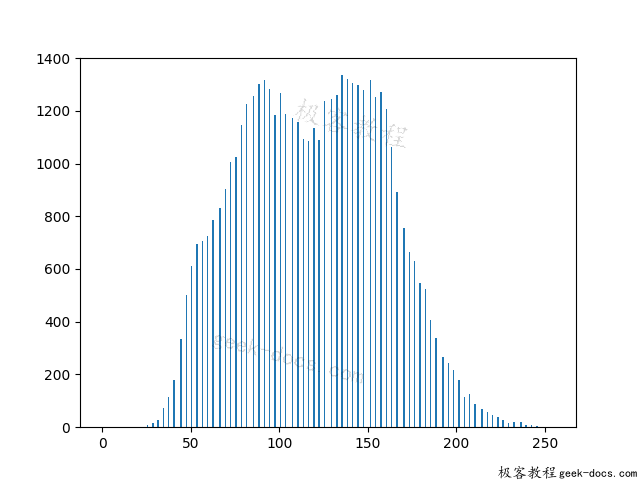来归一化直方图吧。
有时直方图会偏向一边。
比如说,数据集中在0处(左侧)的图像全体会偏暗,数据集中在255处(右侧)的图像会偏亮。
如果直方图有所偏向,那么其动态范围( dynamic range )就会较低。
为了使人能更清楚地看见图片,让直方图归一化、平坦化是十分必要的。
这种归一化直方图的操作被称作灰度变换(Grayscale Transformation)。像素点取值范围从[c,d]转换到[a,b]的过程由下式定义。这回我们将imori_dark.jpg的灰度扩展到[0, 255]范围:

python实现:
import cv2
import numpy as np
import matplotlib.pyplot as plt
# histogram normalization
def hist_normalization(img, a=0, b=255):
# get max and min
c = img.min()
d = img.max()
out = img.copy()
# normalization
out = (b-a) / (d - c) * (out - c) + a
out[out < a] = a
out[out > b] = b
out = out.astype(np.uint8)
return out
# Read image
img = cv2.imread("imori_dark.jpg").astype(np.float)
H, W, C = img.shape
# histogram normalization
out = hist_normalization(img)
# Display histogram
plt.hist(out.ravel(), bins=255, rwidth=0.8, range=(0, 255))
plt.savefig("out_his.png")
plt.show()
# Save result
cv2.imshow("result", out)
cv2.waitKey(0)
cv2.imwrite("out.jpg", out)
c++实现:
#include <opencv2/core.hpp>
#include <opencv2/highgui.hpp>
#include <iostream>
#include <math.h>
// histogram normalization
cv::Mat histogram_normalization(cv::Mat img, int a, int b){
// get height and width
int width = img.cols;
int height = img.rows;
int channel = img.channels();
int c, d;
int val;
// prepare output
cv::Mat out = cv::Mat::zeros(height, width, CV_8UC3);
// get [c, d]
for (int y = 0; y < height; y++){
for (int x = 0; x < width; x++){
for (int _c = 0; _c < channel; _c++){
val = (float)img.at<cv::Vec3b>(y, x)[_c];
c = fmin(c, val);
d = fmax(d, val);
}
}
}
// histogram transformation
for (int y = 0; y < height; y++){
for ( int x = 0; x < width; x++){
for ( int _c = 0; _c < 3; _c++){
val = img.at<cv::Vec3b>(y, x)[_c];
if (val < a){
out.at<cv::Vec3b>(y, x)[_c] = (uchar)a;
}
else if (val <= b){
out.at<cv::Vec3b>(y, x)[_c] = (uchar)((b - a) / (d - c) * (val - c) + a);
}
else {
out.at<cv::Vec3b>(y, x)[_c] = (uchar)b;
}
}
}
}
return out;
}
int main(int argc, const char* argv[]){
// read image
cv::Mat img = cv::imread("imori_dark.jpg", cv::IMREAD_COLOR);
// histogram normalization
cv::Mat out = histogram_normalization(img, 0, 255);
//cv::imwrite("out.jpg", out);
cv::imshow("answer", out);
cv::waitKey(0);
cv::destroyAllWindows();
return 0;
}
输入:

输出:

直方图:

 极客教程
极客教程